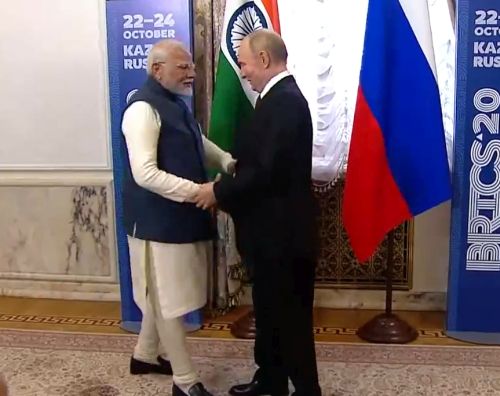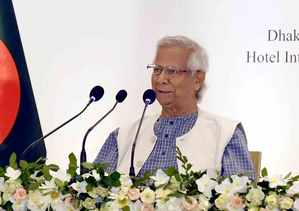International
Understanding the Baloch genocide and its repercussions
New Delhi, March 26 (IANS) Balochistan, a region ensnared in the clutches of an oppressive military regime orchestrated by Pakistan and its intelligence agency, grapples with dire consequences befalling its people.
The sweeping impact of this security apparatus manifests in the recurring horror of forced disappearances and the tragic reality of extrajudicial killings that systematically target the Baloch populace.
In the crucible of this turmoil, the Human Rights Department of the Baloch National Movement (BNM), through its recently unveiled report known as Paank, unveils the intricate human rights landscape in Balochistan for the month of February 2024. This comprehensive document not only sheds light on a disconcerting surge in enforced disappearances but also delves into an insightful examination of the multifaceted challenges confronting the local population.
Throughout the course of February, Balochistan witnessed a distressing total of 33 meticulously documented cases of enforced disappearances spanning diverse regions. Notably, within this grim scenario, 28 individuals were allegedly subjected to forced disappearance, a routine affair, managed to eventually secure release from the confines of torture cells, underscoring the arbitrary and often unjust nature of such actions.
Further, five individuals have been falsely labeled as attackers and were killed in an operation to show the Balochis as a revolutionary force working against the interest of the Pakistan.
In a parallel narrative, the ‘Voice for Baloch Missing Persons’, a non-profit organisation steadfastly committed to advocating for the families of those who were missing in Balochistan, reveals a staggering statistic.
Since 2004, an estimated 7,000 cases have been reported to them, painting a grim picture of the pervasive crisis. In stark contrast, the government’s Commission of Inquiry on Enforced Disappearances acknowledges a significantly lower figure, officially recognising 2,752 ongoing cases as of January 2024.
The stark contrast in reported numbers highlights the profound severity of the Human Rights crisis and the relentless oppression endured by the people of Balochistan.
This dissonance underscores the critical need for transparent and accurate information to address the pervasive brutality and enduring hardships faced by those deeply affected in the region.
The incongruity not only questions the reliability of official records but also emphasises the urgency of a thorough and impartial investigation into the intricate dynamics surrounding enforced disappearances in Balochistan.
Beyond the statistical discrepancies, the aftermath of the conflict between the Pakistan Army and Baloch freedom fighters in Mach reveals another layer of distressing developments.
In this instance, five individuals, previously subjected to forced disappearances and held in custody, were unjustly labeled as attackers, subsequently falling victim to extrajudicial execution. This harsh reality underscores the precarious environment in which the Baloch people not only grapple with the threat of disappearances but also face the danger of unfounded accusations, resulting in fatal consequences after conflicts with military forces.
Delving into the intricate complexities of the human rights crisis in Balochistan unveils a narrative that extends far beyond the stark statistical figures. At its core lies a mosaic of human stories, each marked by profound suffering, unwavering resilience, and an urgent quest for justice.
Families torn apart, communities shattered, and individuals thrust into the shadows epitomise the unseen consequences of an unchecked security apparatus, creating a haunting tapestry of human tragedy.
The urgency of the situation beckons for a collective response from the international community. The pervasive violations in Balochistan not only defy fundamental human rights principles but also challenge the very essence of a just and equitable society.
As the Baloch people grapple with the harrowing realities of enforced disappearances, extrajudicial killings, and the pervasive culture of fear, the global community must elevate its voice in a unified stance for justice and accountability.
Balochistan’s plight stands as a poignant reminder of the profound human cost incurred due to geopolitical conflicts and power struggles.
The intricate tapestry woven by enforced disappearances and extrajudicial killings transcends mere statistics, revealing a deeply entrenched narrative that demands collective action. It serves as a compelling call to those championing human rights, urging them to actively contribute to the construction of a world where justice triumphs over oppression.
The relentless oppression imposed by the Pakistan army and its intelligence agency over the years has given rise to pro-freedom groups, with the Baloch Liberation Army emerging as a prominent force.
Driven by the aspiration to liberate Balochistan from the clutches of Pakistan and its oppressive tactics, these pro-freedom groups, have repeatedly confronted the Pakistan Army, seeking an amicable solution to the oppression and suppression of the Baloch natives.
On ground, these efforts seem to have yielded tangible results, with many successful operations by the pro-freedom armed groupsleading to the seizure of military posts and weapons.
The various articles and blogs on these subjects gives a fair indication that despite Pakistan Army’s recent operation in Balochistan to quell the unrest, people of Balochistan are hopeful to break free from the shackles of endless oppression imposed by the Pakistan army and ISI.
The experts feel that the pro-freedom groups is likely to persist in their pursuit of justice and liberation, till end of suppression and oppression, which is highly unlikely given the Army’s say in the matters of governance and security in the present government.
–IANS
mr/svn
International
Lee Hsien Yang seeks refuge in United Kingdom

Lee Hsien Yang, the youngest son of Singapore’s founding father, the late Lee Kuan Yew, announced on Tuesday that he is now a political refugee in the United Kingdom after seeking asylum from the British government “as a last resort.”
“I remain a Singapore citizen and hope that someday it will be safe to return home,” Lee stated in a Facebook post, as reported by Channel News Asia (CNA).
Citing what he described as the Singapore government’s “attacks” against him, Lee, who is the younger brother of former Prime Minister Lee Hsien Loong, revealed that he sought asylum protection in 2022.
Lee Hsien Yang and his late sister, Lee Wei Ling, who passed away earlier this month, have been in conflict with their brother Lee Hsien Loong over the fate of their father’s home following his death in 2015, resulting in a public dispute that has estranged the siblings.
In an interview with the UK-based newspaper The Guardian, Lee alleged that a “campaign of persecution” compelled him to seek asylum in Britain.
In response to his claims, the Singapore government stated that there is “no basis” for his allegations of “a campaign of persecution” or other assertions regarding political repression in the country.
“Singapore’s judiciary is impartial and makes decisions independently. This is why Singaporeans have a high level of trust in the judiciary,” a government spokesperson remarked.
The spokesperson added that there are no legal restrictions preventing Lee and his wife, lawyer Lee Suet Fern, from returning to Singapore. “They are and have always been free to return to Singapore,” the spokesperson said.
Lee and his wife have been outside of Singapore since 2022, having opted not to attend a scheduled police interview regarding potential offenses related to providing false evidence in judicial proceedings concerning their father’s will and the family home.
Lee and his late sister, who had been living at the property, alleged they felt threatened while trying to fulfill their father’s wish to demolish the house. They also accused their elder brother, former Prime Minister Lee Hsien Loong, of abusing his governmental influence to advance his personal agenda.
International
Indo-Russian ties are stronger than ever before at BRICS

Kazan, Russia: Prime Minister Narendra Modi held a bilateral meeting with Russian President Vladimir Putin on the sidelines of the 16th BRICS Summit.
During the meeting, President Putin remarked, “I recall our meeting in July, where we had productive discussions on various issues. We’ve also spoken over the phone several times. I am very grateful you accepted the invitation to come to Kazan. Today, we will attend the BRICS Summit’s opening ceremony, followed by dinner.”
PM Modi responded by expressing his appreciation, saying, “I sincerely thank you for your friendship, warm welcome, and hospitality. It’s a great pleasure to visit such a beautiful city as Kazan for the BRICS Summit. India shares deep historical ties with this city, and the opening of our new embassy here will further strengthen these connections.”
International
Laos seeks to enhance nutrition amid climate change concerns

Vientiane (Laos), Aug 22 (IANS) Representatives from the Lao government and development partners have attended a conference here titled “Climate Change and Nutrition in Laos: Intersections and Interventions” to discuss the impact of climate change on nutrition in the Southeast Asia country and potential solutions.
Speaking at the conference, deputy director general of the Department of Hygiene and Health Promotion under the Lao Ministry of Health Viengkhan Phixay, said, “We gather to address a critical and interwoven issue: the impact of climate change on nutrition and how we can work together to tackle these challenges,” Xinhua news agency reported.
The Lao government is actively engaged in this endeavor, with numerous policies and initiatives aimed at addressing both climate change and nutrition, Lao National Television reported on Thursday.
“By leveraging the Scaling Up Nutrition network in Laos, which is led by the government, and supported by civil society, donors, and the United Nations, we have a robust platform to tackle the negative impacts of climate change while improving nutrition and overall health for everyone in Laos,” Viengkham said at the conference held on Monday.
The conference featured a series of presentations that not only detailed evidence-based research but also introduced innovative tools for measuring and enhancing nutrition under the impact of climate change.
The conference stressed the critical need for integrated approaches to tackle the intertwined challenges of climate change and nutrition, and setting the stage for impactful future collaborations.
–IANS
int/psd
International
One killed, seven injured in shootout in Iraq

Baghdad, Aug 22 (IANS) A civilian was killed while seven others were injured on Thursday in a tribal shootout in Iraq’s holy Shiite province of Najaf, according to a local security source.
The shootout erupted in the early hours between armed men from the local tribe in the al-Zarga area in northern Najaf, some 160 km south of Baghdad, a local police officer told Xinhua on condition of anonymity.
The clash resulted in the killing of an Iraqi civilian and the injury of seven others, including three Iranian Shiite pilgrims, the source added.
A joint force from the Interior Ministry’s emergency response division and Najaf provincial police arrested 53 gunmen from both sides of the shootout and seized weapons and ammunition, the Interior Ministry said in a statement.
It added that search operations are ongoing to locate additional gunmen and weapons, with more details to be released later.
The incident took place as numerous pilgrims traveled to the city of Karbala to observe Arbaeen, which marks the end of a 40-day mourning period for the killing of Imam Hussein, the grandson of Prophet Muhammad, in the Battle of Karbala in 680 A.D.
Typically, these pilgrims also visit Najaf as part of their journey to Karbala.
–IANS
int/jk/arm
International
Bangladesh seeks $1 billion budget support from World Bank

Dhaka, Aug 22 (IANS) Bangladesh’s interim government has sought $1 billion from the World Bank as budgetary support.
The call came from the country’s Power, Energy and Mineral Resources Adviser Muhammad Fouzul Kabir Khan’s meeting with Abdoulaye Seck, the World Bank’s Country Director for Bangladesh and Bhutan, in Dhaka on Wednesday.
He made the plea as the ministry owes more than 2 billion dollars to suppliers in import costs of power and energy, Xinhua news agency reported.
Khan mentioned that the interim government, which was formed with many pressing mandates, is due to settle a $2 billion debt left by the previous government in the power sector.
He said they have already suspended activities under the much-criticized Quick Enhancement of Electricity and Energy Supply Act 2010 and abolished the government’s power to set energy prices without any public hearing.
On August 5, the former Prime Minister of Bangladesh, Sheikh Hasina, was ousted from her country and power, ending her rule since January 2009.
This event was seen as a massive escalation, with what initially started as student’s protests and resulted in a major crisis in Bangladesh.
Earlier on August 8, Nobel laureate Muhammad Yunus took oath as the head of Bangladesh’s interim government.
–IANS
int/jk/as
-
Video2 years ago
PM Modi Attacks Congress in Karnataka with “Kerala Story”
-
Politics2 years ago
Siddaramaiah & DK Shivakumar sworn in as Chief Minister & Deputy CM respectively
-
Cricket2 years ago
CSK players rejoice 5th IPL title with their families (Pics)
-
Entertainment2 years ago
Karan Deol weds his longtime Girlfriend Drisha Acharya (Pics)
-
Entertainment2 years ago
Urvashi Rautela dazzles on Cannes 2023 red carpet (Pics)
-
Sports7 years ago
History Of Official FIFA WORLD CUP Match balls
-
Entertainment2 years ago
Sunny Leone gets ready for Kennedy premiere in Cannes (Pics)
-
India2 years ago
Ashwini Vaishnaw: Railway Board recommends CBI probe in the Odisha railway disaster






























